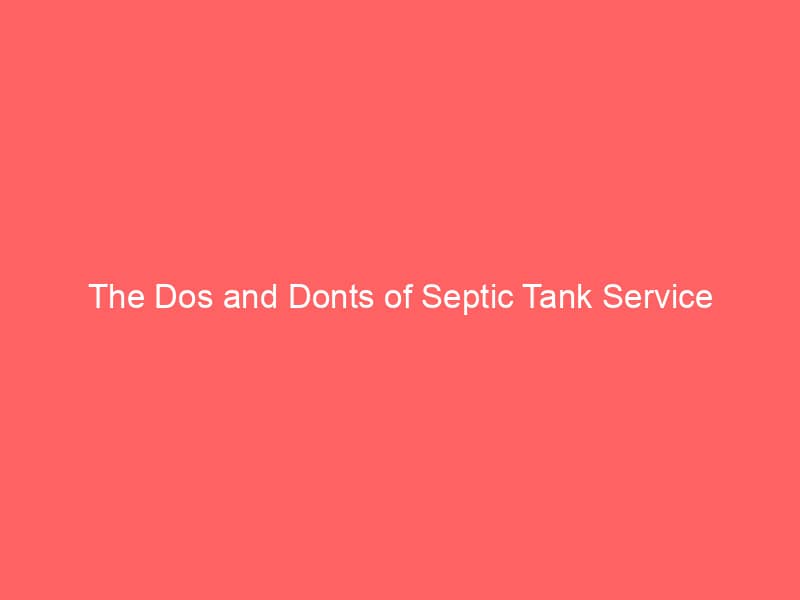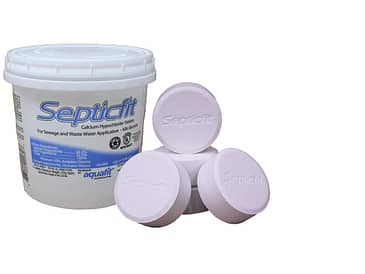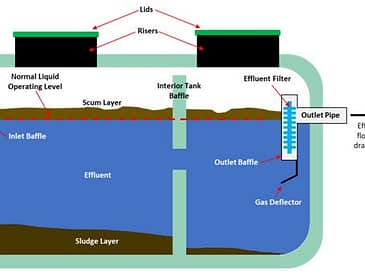Septic tanks are an essential part of many homes, providing a safe and effective way to dispose of wastewater. However, they require regular maintenance and attention to ensure they function correctly. Unfortunately, many homeowners make mistakes when it comes to septic tank service, which can lead to costly repairs and health hazards.
In this article, we will explore the dos and don’ts of septic tank service in detail. We will discuss the proper maintenance techniques that homeowners should follow and highlight some common mistakes that they should avoid. By following these guidelines, readers can ensure that their septic tank remains in good working order and avoids unnecessary problems.
The Dos and Don’ts of Septic Tank Cleaning Services
Septic tanks are an important aspect of any home or commercial building that relies on a septic system to dispose of wastewater. Proper maintenance is essential to ensure the longevity and functionality of the septic tank. Unfortunately, many homeowners or business owners are not aware of the proper dos and don’ts of septic tank cleaning services. In this section, we will highlight some crucial information about what you should do and avoid when it comes to maintaining your septic tank.
Dos: Proper Maintenance of Septic Tank Pumping Services
One crucial aspect of proper septic tank maintenance is regular pumping services. Experts recommend that homeowners have their septic tanks pumped every three to five years, depending on usage. Regular pumping ensures that waste does not build up in the tank, causing blockages or damage to the system.
Homeowners should also ensure that only qualified professionals provide pumping services. Attempting to pump your septic tank without experience can lead to severe damage or contamination. A professional service provider will also inspect your entire system and identify any potential issues before they become significant problems.
Don’ts: Avoiding Septic Tank Pumping Mistakes
Avoid making common mistakes when it comes to pumping your septic tank. One mistake is waiting too long between pumping services, which can result in costly repairs or even complete system failure. Another mistake is using harsh chemicals such as drain cleaners or bleach, which can kill off beneficial bacteria in the system needed for waste breakdown.
Another common mistake homeowners make is flushing inappropriate items down their toilets or drains such as coffee grounds, cigarette butts, feminine hygiene products, and cooking grease/oils/fats. These items can clog pipes leading from the house into the septic tank and cause damage to the entire system.
Dos: Best Practices for Septic Tank Maintenance
Regular septic tank maintenance practices can ensure the longevity of your system. Simple practices such as conserving water, fixing leaks, and avoiding overloading the system can significantly help maintain your septic tank. Conserving water means reducing usage through low-flow showerheads/toilets/faucets or taking shorter showers. Fixing leaks prevents excess water from entering the system, preventing overloading. Avoiding overloading means spreading out laundry usage or dishwashing days to avoid stressing out the septic tank.
Don’ts: Common Septic System Cleaning Misconceptions
Misconceptions about cleaning a septic system are common among homeowners. For instance, some people believe that adding yeast or other additives to their tanks boosts bacteria levels and improves waste breakdown rates. This is not only ineffective but can also be harmful to your system since it may interfere with natural bacterial activity in the tank.
Another misconception is that using chemical drain cleaners will help clean up clogs in your pipes leading to your septic tank. Unfortunately, these products contain harsh chemicals that kill beneficial bacteria in your tank and are toxic to groundwater when flushed down drains or toilets.
Dos: Proper Maintenance of Septic Tank Pumping Services
Septic tank pumping is an essential service that every homeowner with a septic system needs to carry out regularly. This process involves removing accumulated waste materials from the septic tank to ensure it functions efficiently. Proper maintenance of this service can help prevent costly repairs and replacements, as well as improve the longevity of the septic system.
Schedule Regular Pumping
One of the most important dos of proper septic tank maintenance is scheduling regular pumping. The frequency at which you should pump your septic tank depends on several factors, such as household size, water usage, and the size of your septic system. Experts recommend pumping every 3-5 years for a typical household.
Conserve Water Usage
Another important aspect of proper maintenance for septic tank pumping services is conserving water usage. An overloaded septic system can fail prematurely and create expensive repairs or replacement costs down the road. Avoid excessive water consumption and make sure all plumbing fixtures are functioning correctly to avoid overloading your drainage system.
Maintain Drainage Fields
To ensure efficient operation, regular inspection and maintenance of drainage fields are necessary when it comes to maintaining your septic system. Keep drainage fields free from heavy objects or vehicles that can compact soil, which reduces their effectiveness in percolating wastewater back into the ground.
Hire Professional Septic Tank Service Providers
To extend the life span and functionality of your septic system properly, hire reliable professionals with experience in providing high-quality service. Professional technicians will assess all aspects required for optimal performance while ensuring compliance with local regulations and laws.
In conclusion, proper maintenance practices for septics tanks include scheduling regular pumping intervals, reducing water usage, maintaining drainage fields, and hiring professional service providers. With the appropriate maintenance practices, homeowners can avoid costly repairs or early replacement costs while extending the life of their septic system.
Don’ts: Avoiding Septic Tank Pumping Mistakes
Septic tanks play a vital role in keeping your home or business sanitary. Keeping them clean is essential for the safety and well-being of everyone who uses them. However, there are some common mistakes people make when it comes to septic tank pumping that can lead to costly repairs or even system failure.
Avoid Waiting Too Long Between Pumpings
One of the biggest mistakes people make is waiting too long between pumpings. Most experts recommend having your septic tank pumped every 3-5 years, depending on usage. Failing to do so can cause solids to build up in the tank, which can eventually lead to clogs and backups.
Ignoring signs of trouble, such as slow drains or foul odors, can also be a mistake. If you notice any issues with your septic system, it’s best to address them sooner rather than later.
Avoid Using Chemical Drain Cleaners
Another mistake people make when it comes to septic tank pumping is using chemical drain cleaners. These products are not only harmful to the environment, but they can also kill off the beneficial bacteria in your septic system that help break down waste.
If you have a clogged drain, try using a plunger or plumbing snake before resorting to harsh chemicals. If these methods don’t work, call a professional plumber who specializes in septic systems.
Avoid Flushing Non-Biodegradable Items
You should only flush toilet paper and human waste down your toilets if you want your septic system running smoothly. Flushing non-biodegradable items such as baby wipes, feminine hygiene products, and dental floss can cause major problems for your system over time.
These items can clog pipes and cause backups, leading to costly repairs. To avoid these issues, be mindful of what you flush and dispose of non-biodegradable items in the trash.
Avoid Parking or Building on Top of Your Septic System
If you have a septic system, it’s important to know where your tank and drain field are located. Avoid parking vehicles or building structures on top of them, as this can damage the system and lead to costly repairs.
It’s also a good idea to avoid planting trees or shrubs near your septic system, as their roots can grow into the pipes and cause clogs. Keep the area around your septic system clear to avoid problems down the road.
By avoiding these common mistakes when it comes to septic tank pumping, you can help ensure that your system runs smoothly for years to come. Remember to schedule regular pumpings, avoid using chemical drain cleaners, only flush biodegradable items down your toilets, and keep the area around your septic system clear.
Best Practices for Septic Tank Maintenance
When it comes to septic tank maintenance, there are certain best practices that you should follow to keep your system running smoothly and avoid costly repairs or replacements. Here are some of the most important things to keep in mind:
Regular Pumping
The first and most important step in septic tank maintenance is regular pumping. Most experts recommend that you have your tank pumped every 3-5 years, depending on the size of your household and the amount of waste your system generates. Failing to pump regularly can lead to clogs, backups, and even system failure.
In addition to regular pumping, you should also make sure that you’re not putting anything into your system that could cause damage or clogs. This includes things like grease, oil, feminine hygiene products, and paper towels. Stick to flushing only human waste and toilet paper down the toilet.
Maintain Drainfield Health
Your drainfield is a crucial component of your septic system’s performance. To maintain its health, make sure you’re not driving over it or parking vehicles on top of it. Additionally, avoid planting trees or shrubs too close to the drainfield as their roots can cause damage.
You may also want to consider installing a filter between your tank and drainfield outlet pipe. These filters help prevent solids from entering the drainfield and causing problems.
Inspections
In addition to regular pumping, it’s important to have periodic inspections done on your septic system. A professional inspector can identify any potential issues before they become major problems and cost a lot of money.
You’ll also want to keep an eye out for signs that something might be wrong with your system – such as slow drains, foul odors, or gurgling sounds from your pipes. If you notice any of these signs, it’s important to call a professional right away to have the issue addressed.
Use Septic-Friendly Products
Finally, make sure you’re using septic-friendly products in your home. This includes things like laundry detergent and dish soap that are labeled as “septic safe.” Additionally, you may want to consider using natural cleaning products rather than harsh chemicals that can damage your system.
By following these best practices for septic tank maintenance, you can keep your system running smoothly and avoid costly repairs or replacements down the road. Remember – investing in regular maintenance now can save you a lot of money and headaches in the long run!
Don’ts: Common Septic System Cleaning Misconceptions
Septic systems are often misunderstood, which can lead to costly mistakes. Here are some common misconceptions when it comes to septic system cleaning:
1. Don’t Wait Until There’s a Problem
A common misconception about septic system cleaning is that it’s only necessary when there’s a problem. Waiting until there’s an issue with your septic system could result in costly repairs or even a complete replacement of your tank. Regular maintenance and cleaning can prevent problems from occurring in the first place.
2. Don’t Use Harsh Chemicals
Cleaning products with harsh chemicals, such as bleach and drain cleaners, can damage your septic system by killing the beneficial bacteria that break down waste in your tank. Avoid using these products and opt for natural alternatives like vinegar or baking soda instead.
3. Don’t Overload Your System
Your septic system is designed to handle a certain amount of waste at a time. Overloading it with too much water or flushing non-biodegradable items like wipes or feminine hygiene products can cause clogs and backups.
4. Don’t Skip Professional Inspections
Failing to have your septic system inspected by a professional on a regular basis is another common misconception. Even if you think everything is running smoothly, small problems could be brewing beneath the surface that only an expert would be able to detect.
In conclusion, understanding the dos and don’ts of septic system cleaning will help you avoid costly mistakes and keep your tank running smoothly for years to come.
Choosing the Right Septic Tank Treatments
Septic tank treatments are critical in maintaining a healthy septic system. However, with so many options available, it can be challenging to choose the right treatment for your specific needs. Here are some dos and don’ts when selecting septic tank treatments.
Dos: Consider natural options
Natural septic tank treatments contain enzymes and bacteria that promote the breakdown of solids in your septic system. They are environmentally friendly and safe for humans and animals. Look for products that contain live cultures or bacteria that target specific types of waste, such as toilet paper or grease.
Additionally, regular use of natural treatments can prevent clogs and backups while reducing odors in your home. Natural alternatives will not harm nearby vegetation if overused or used improperly like chemical solutions.
Don’ts: Overuse or misuse chemicals
While chemical treatments may seem more powerful at first glance, they may harm your septic system’s delicate balance if overused or misused. Harsh chemicals can destroy beneficial bacteria responsible for breaking down waste which leads to reduced efficiency of the whole septic system.
Bleach-based cleaners such as disinfectants should be avoided as they can kill off these microorganisms necessary to maintain a healthy environment within the tank. It is also important to note that there is no magic solution that will instantly solve all issues with your septic tank; if you suspect something is wrong with your system it should be professionally inspected rather than trying to fix it yourself with an over-the-counter product.
Dos: Consult a professional
If you are unsure about which treatment option is best for you, consult a professional plumber who specializes in septic systems before making any purchases. They will help you to select the right treatment that meets your needs and is compatible with your septic system. A professional can also advise how often to apply treatments for best results based on the tank size and usage habits of your household.
Don’ts: Ignore warning signs
The most important thing is not to ignore warning signs of a failing septic system. Ignoring symptoms such as slow drains, bad odors, or unusual sounds, can lead to costly repairs or backups in your home. Applying extra treatments without professional diagnosis and advice can exacerbate existing issues rather than solving them.
Ultimately, selecting the right septic tank treatment requires careful consideration and expert advice. Regular maintenance with natural products and appropriate management habits should keep your system running smoothly for years while avoiding costly repairs.
Don’ts: Overusing or Misusing Septic Tank Treatments
Septic tank treatments are essential for maintaining the overall health of your septic system. However, overusing or misusing these treatments can lead to serious problems that could have been easily avoided.
Avoid Harsh Chemicals:
One of the most common mistakes when it comes to septic tank treatments is using harsh chemicals that can harm the bacteria in the system. While some products may claim to “clean” your septic system, they can actually disrupt its natural balance and cause more harm than good. Avoid using any chemical products unless they are specifically designed for use in a septic system.
Do Not Flush Things Down The Toilet:
You should never flush anything down the toilet that could potentially harm your septic system. This includes items like cigarette butts, feminine hygiene products, and even certain types of toilet paper. These items can clog pipes and damage your septic system over time, leading to expensive repairs.
Avoid Overuse Of Antibacterial Soaps:
Antibacterial soaps and cleaners may seem like a good way to keep your home clean and germ-free, but they can also kill off the beneficial bacteria in your septic tank. When this happens, the balance of your septic system is disrupted, which could lead to serious issues like backups or even complete failure.
Do Not Pour Grease Down The Drain:
Grease is one of the most common causes of clogged pipes and damaged septic systems. When you pour grease down the drain, it solidifies inside your plumbing and creates blockages that can be difficult to remove. Instead of pouring grease down your sink or toilet, dispose of it properly in the trash.
By avoiding these common mistakes, you can ensure that your septic system stays healthy and functional for years to come. Make sure to follow proper maintenance procedures and use treatments only as directed by a professional.
Conclusion
In conclusion, proper maintenance and care is crucial for the longevity and functionality of your septic tank system. By following the dos and avoiding the don’ts, you can ensure that your septic tank service runs smoothly for years to come. Remember to always choose a reputable service provider, follow recommended maintenance practices, and avoid common misconceptions. With these tips in mind, you can protect your investment and avoid costly repairs down the line. Take care of your septic system, and it will take care of you!



